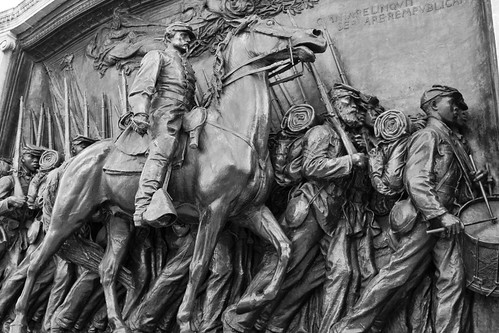It's still National Poetry Month! So, in anticipation of tomorrow night's Lowell Film Festival opening selection: "Glory" -- a film that tells the story of Colonel Robert Gould Shaw's all black Union regiment (Massachusetts 54th) -- I thought we'd share a selection from Robert Lowell's poem "For The Union Dead."
Written in 1960, Lowell's poem vividly describes the Shaw monument on Boston Common and is itself an interesting meditation on monuments in general, the impact of war, and the toll of loss. The full poem is available here and well worth reading.
from For The Union Dead
Two months after marching through Boston,
half the regiment was dead;
at the dedication,
William James could almost hear the bronze Negroes breathe.
Their monument sticks like a fishbone
in the city's throat.
Its Colonel is as lean
as a compass-needle.
He has an angry wrenlike vigilance,
a greyhound's gentle tautness;
he seems to wince at pleasure,
and suffocate for privacy.
He is out of bounds now. He rejoices in man's lovely,
peculiar power to choose life and die--
when he leads his black soldiers to death,
he cannot bend his back.
On a thousand small town New England greens,
the old white churches hold their air
of sparse, sincere rebellion; frayed flags
quilt the graveyards of the Grand Army of the Republic.
The stone statues of the abstract Union Soldier
grow slimmer and younger each year--
wasp-wasted, they doze over muskets
and muse through their sideburns....
Shaw's father wanted no monument
except the ditch,
where his son's body was thrown
and lost with his "niggers."
The ditch is nearer.
There are no statues for the last war here;

No comments:
Post a Comment